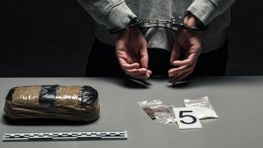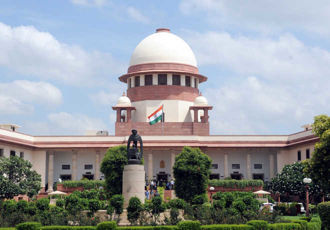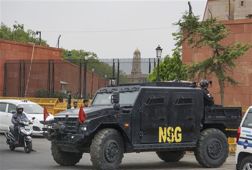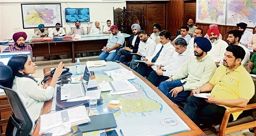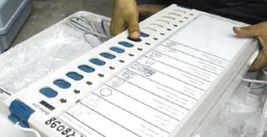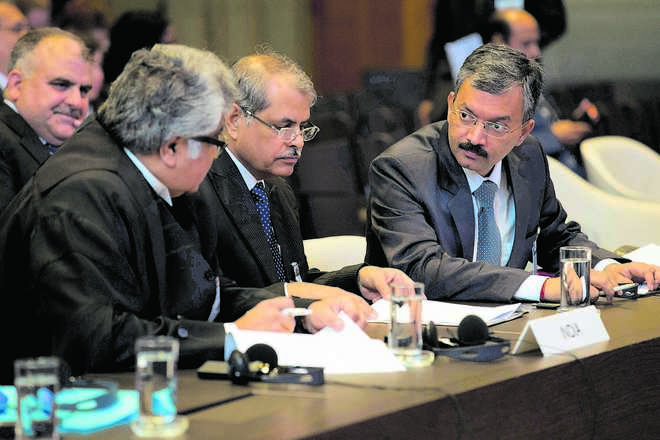
Long Haul: The principle of fair justice warrants transparency in the case.
Gen VP Malik (Retd)
THE sham trial of Kulbhushan Jadhav by the Pakistan military court will be back in news next week when the ICJ sets down a time table for the full hearing of the case.
India’s decision to take Jadhav’s case to the ICJ was a bold and courageous step. Firstly, on the investigation and judicial front, there are far too many loopholes which require to be brought to the notice of the international community. Secondly, in approaching the ICJ, we adopted a proactive diplomatic stance; a turning point in our diplomacy from the kind of chicanery noticed when mutilated bodies of Saurabh Kalia and his colleagues were handed over by the Pakistan army during the Kargil war.
Jadhav has been convicted and sentenced to death by a military court established under the 21st Amendment of the Pakistan’s constitution to implement its national action plan against terrorism. This constitutional amendment has given extra-judicial powers to Pakistani military courts. As per sub-clause inserted in Section 2, Chapter 1 of the Pakistan Army Act-1952 (PAA), ‘Any person who is or claims or is known to belong to any terrorist group or organisation using the name of religion or sect and raises army or wages war against Pakistan or attacks the armed forces of Pakistan and law enforcement agencies, or attacks any civil or military installations in Pakistan or kidnaps any person for ransom or causes death of any person or injury, shall be punished under this Act’. With this clause, Pakistan has become the only country in South Asia which allows trial of civilians by military courts.
Jadhav’s case has highlighted the violation of the Vienna Convention on consular relations, gross violation of rights and natural justice, and sham probe and trial by Pakistan’s military court.
Jadhav was (allegedly) arrested by the Pakistan army at Mashkel (a remote Kharan desert town, 85 per cent destroyed in the 2013 earthquake) near the Iran border on March 3, 2016. Within three weeks, his so-called confession was put out for public viewing on video-tape. Is it possible to carry out a full probe that requires visits to distant locations, examination of witnesses and corroboration of testimony within such a short time? It looks extremely doubtful.
He has been charged with providing financial backup and training to several agents involved in terrorist activities against Pakistan. Who are these agents? What and where was their training carried out? Where is the proof of money paid to them? The prosecution of such cases would always be a joint trial for the co-accused. But there is no indication of any other person involved or facing trial with Jadhav.
What about the process of law?
The amended PAA allows military courts to try ‘any person who is or claims or is known to belong to any terrorist group or organisation using the name of religion or sect’. But in this case, the prosecution has not indicated the identity of any ‘terrorist group or organisation using the name of religion or sect’.
In military courts, the accused has a right to challenge the members and question its jurisdiction. There is no evidence that this vital right was offered to Jadhav. He was given assistance of a defending officer — a military officer with little or no legal qualification. Pakistan army court-martials under this Act do not allow the accused access to civil lawyers. The courts conduct trials in total secrecy. The location and timings of court-martials are not made public.
Military law, like the civilian code of criminal procedure, mandates a court-martial not to accept a plea of guilty where the charge can involve a death sentence. The trial has to be processed considering the accused as ‘not guilty’. The confession has to be supported by corroborative evidence to establish his guilt beyond all reasonable doubt. There is no such proof in this case.
The principle of fair justice warrants a written judgment by a court, explaining the logic behind the verdicts. But Pakistan military courts are not required to give such documents. Even the families of convicts are not told about the investigation and evidence related to the case. How can then one file an appeal against the verdict when essential evidence, findings and legal reasoning are not made public and given to the accused?
Under Section 133B of the PAA, an accused has no remedy against the decision of a court-martial except appeal. These Sections state any person to whom a court-martial has awarded a sentence of death, imprisonment for life, imprisonment exceeding three months or dismissal from service may prefer an appeal against the finding/sentence to a Court of Appeals headed by a Major-General within 40 days from the date of announcement of finding/sentence. The decision of the Court of Appeals cannot be called in question before any court or other authority whatsoever.
A recent report by Pakistan’s Inter-Services Public Relations on the trials of terror cases for 2016 says about 90 per cent accused confessed to the charges. This unusually high percentage of confession has raised doubts. It indicates that questionable interrogation and torture means have been used to elicit such confessions.
The civil society in Pakistan has questioned the setting up and functioning of military courts, especially on the trial of civilians. According to Rafia Zakaria, an attorney and political philosopher of Pakistani origin, ‘The secrecy surrounding military courts leaves them open to charges of contravening legal principles and pursuing their own vendettas against this or that terrorist group, instead of sticking to the principles of justice and obtaining convictions via fair procedures…Given that military courts in Pakistan do not work under a system of legal precedent, little information exists as to the basis of convictions and acquittals. Moreover, since evidence is rarely made public, plenty of room is created for conspiracy theorists to place doubt on any conviction that is produced under their auspices’.
Pakistan has flouted the Vienna Convention to which India and Pakistan are signatories. The ICJ provisional order has ensured that Jadhav will not be hanged quietly but denial of consular access continues. The legal battle will be long. While India fights for Jadhav’s life, the kangaroo military courts of Pakistan would also be exposed.
The writer is a former Army Chief





















